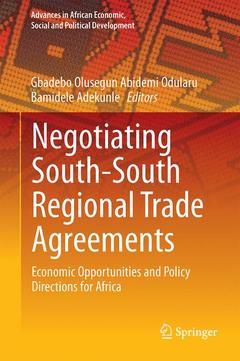Description
Negotiating South-South Regional Trade Agreements, Softcover reprint of the original 1st ed. 2017
Economic Opportunities and Policy Directions for Africa
Advances in African Economic, Social and Political Development Series
Language: English
Subjects for Negotiating South-South Regional Trade Agreements:
Publication date: 02-2017
Support: Print on demand
Publication date: 07-2018
Support: Print on demand
Description
/li>Contents
/li>Biography
/li>Comment
/li>
This book provides a comprehensive analysis of South-South regional trade issues, with a particular focus on sustainably fostering Africa?s regional trade agenda. It examines the extent to which South-South regional trade agreements (RTAs) have contributed toward enhancing regional integration and economic expansion in Africa in particular, and in the South in general. The authors recommend new conceptual frameworks, appropriate initiatives, and workable policy recipes to help South-South RTAs enhance Africa?s economic transformation trajectory.
The book underscores the geo-politics, as well as the opportunities and challenges that emerging economies now represent for Africa in the context of South-South regional trade policy. Readers will learn how Africa can strengthen its regional trade game by securing and building on the positive outcomes of South-South RTAs.
Gbadebo Odularu is a research associate at the Center for Research on Political Economy (CREPOL), working closely with national, continental and international partners to provide evidence-based policy tools for fostering regional and sustainable development in Africa. He is also an adjunct professor at the School of Business, Marymount University, Arlington, USA. He holds a PhD in Regional Economic Development from the University of Sunderland, United Kingdom and an M.Sc (Agricultural Economics); and B.Sc (Economics) from the Nigerian University of Ibadan. He was a field supervisor for the United States Agency for International Development (USAID) funded collaborative study on the constraints, opportunities, and strategic choices available to the Nigerian rice economy in a competitive world. Gbadebo Odularu is currently the 2016 – 2017 Diversity Initiative for Tenure in Economics (DITE) fellow. He has been visiting scholars at: the Centre for the Study of African Economies (CSAE), University of Oxford, United Kingdom (UK); Centre for Regional Economic Studies (CRES), Korea Institute for International Economic Policy (KIEP), Seoul, South Korea; United Nations Institute for Economic Development Planning (UNIDEP), Dakar, Senegal; and the Smith School of Enterprise and the Environment (SSEE), University of Oxford, UK. He was also the 2008 visiting doctoral scholar at the Economic Research and Statistical Division (ERSD), World Trade Organisation, Geneva, Switzerland. Gbadebo Odularu is a member of the Natural Resources, Agricultural Development and Food Security International Research Network (NAR-IRN), the Chatham House, the Nigerian Leadership Initiative (NLI), the African Finance and Economics Association (AFEA), the Academic Council of the United Nations System (ACUNS), African Economic Research Consortium (AERC) Network and the Nigerian Economic Society (NES). He has also been a member of the African Growth and Development Policy
Provides comprehensive and innovative coverage of South-South trade policy issues, with special focus on fostering Africa’s regional trade agenda
Includes chapters on Africa’s trade relations with Korea, Brazil, China and India
Presents practical policy recommendations towards making Africa a strategic game player in South-South regional trade landscape




